Rimbaud
Les Illuminations
Translated by A. S. Kline © Copyright 2002, 2008 All Rights Reserved
This work may be freely reproduced, stored and transmitted, electronically or otherwise, for any non-commercial purpose. Conditions and Exceptions apply.
Contents
- After the Flood
- Childhood
- Tale
- Parade
- Antique
- Being Beauteous
- Vies
- Departure
- Royalty
- To Reason
- Drunken Morning
- Sentences
- Workers
- The Bridges
- City
- Ruts
- Cities
- Vagabonds
- Cities
- Vigils
- Mystic
- Dawn
- Flowers
- Mundane Nocturne
- Marine
- Winter Feast
- Anguish
- Metropolitan
- Barbarian
- Promontory
- Scenes
- Historic Evening
- Movement
- Bottom
- H
- Prayer
- Democracy
- Fairy
- War
- Genie
- Youth
- Sale
After the Flood
(Illuminations I: Après le Déluge)
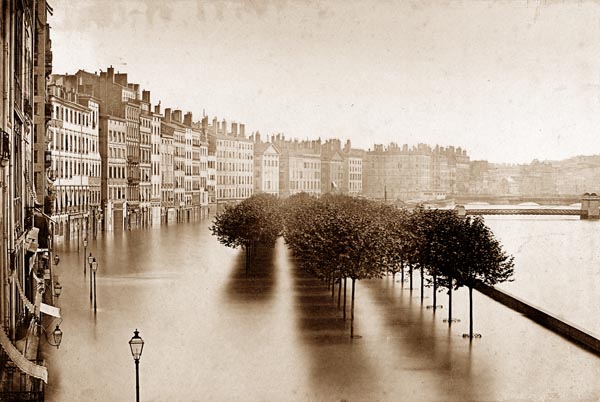
‘A Flood in Lyon’
Louis-Antoine Froissart (French, 1815 - 1860), Getty Open Content Program
As soon as the idea of the Flood was finished, a hare halted in the clover and the trembling flower bells, and said its prayer to the rainbow through the spider’s web.
Oh! The precious stones that hid, – the flowers that gazed around them.
In the soiled main street stalls were set, they hauled the boats down to the sea rising in layers as in the old prints.
Blood flowed, at Blue-beard’s house – in the abattoirs in the circuses where God’s promise whitened the windows. Blood and milk flowed.
The beavers built. The coffee cups steamed in the bars.
In the big greenhouse that was still streaming, the children in mourning looked at the marvellous pictures.
A door banged, and, on the village-green, the child waved his arms, understood by the cocks and weathervanes of bell-towers everywhere, under the bursting shower.
Madame *** installed a piano in the Alps. The Mass and first communions were celebrated at the hundred thousand altars of the cathedral.
Caravans departed. And the Hotel Splendide was built in the chaos of ice and polar night.
Since then, the Moon’s heard jackals howling among the deserts of thyme – and pastoral poems in wooden shoes grumbling in the orchard. Then, in the burgeoning violet forest, Eucharis told me it was spring.
Rise, pond: – Foam, roll over the bridge and under the trees: – black drapes and organs – thunder and lightning rise and roll: – Waters and sadness rise and raise the Floods again.
Because since they abated – oh, the precious stones burying themselves and the opened flowers! – It’s wearisome! And the Queen, the Sorceress who lights her fire in the pot of earth, will never tell us what she knows, and what we are ignorant of.
Childhood
(Illuminations II: Enfance)
I
That idol without ancestors or court, black-eyed and yellow-haired, nobler than legend, Mexican and Flemish: his land insolent azure and green, skirts beaches named by the waves, free of vessels, with names ferociously Greek, Slav, Celtic.
At the edge of the forest – flowers of dream chime; burst, flare – the girl with orange lips, knees crossed in the clear flood that rises from the meadows, nudity shadowed, traversed and clothed by rainbows; flowers, the sea.
Ladies who stroll on terraces by the sea: many a girl-child and giantess, superb blacks in the verdigris moss, jewels arrayed on the rich soil of groves and the little thawed-out gardens – young mothers and elder sisters with looks full of pilgrimage, Sultanas, princesses with tyrannical costumes, little foreign girls and gently unhappy people.
What tedium, the hour of the ‘beloved body’ and ‘dear heart’!
II
It’s she, the little dead girl, behind the roses. – The young mother, deceased, descends the steps. – The cousin’s carriage squeaks over the sand. – The little brother – (he’s in India!) there, in front of the sunset, in the meadow of carnations. The old ones buried upright in the ramparts overgrown with wallflowers.
The swarm of golden leaves surrounds the General’s house. They are in the south. – You follow the red road to reach the empty inn. The chateau’s for sale: the shutters are loose. – The priest will have carried off the key to the church. – Around the park the keepers’ cottages are untenanted. The fences are so high you can see nothing but rustling treetops. Besides, there’s nothing there to be seen.
The meadows rise to hamlets without cockerels, without anvils. The sluice gate is raised. O the crosses and windmills of the wild, the isles and the stacks.
Magic flowers buzzed. The slopes cradled him. Creatures of fabulous elegance circled round. Clouds gathered over the open sea made of an eternity of warm tears.
III
There’s a bird in the woods, its song makes you stop and blush.
There’s a clock that never chimes.
There’s a hollow with a nest of white creatures.
There’s a cathedral that descends, and a lake that rises.
There’s a little carriage abandoned in the copse, or running down the lane, beribboned.
There’s a troupe of little players in costume, glimpsed on the road through the edge of the woods.
There’s someone, at last, when you’re hungry and thirsty, who drives you away.
![Carriage; Fir Woods, Copsham [Adaptation]](https://www.poetryintranslation.com/pics/French/interior_rimbaud_enfance.jpg)
‘Carriage; Fir Woods, Copsham [Adaptation]’
Frederick H. Evans (British, 1853 - 1943), Jean-Gabriel Eynard (Swiss, 1775 - 1863)
Getty Open Content Program
IV
I’m the saint, praying on the terrace – as the peaceful beasts graze down to the sea of Palestine.
I’m the scholar in the dark armchair. Branches and rain fling themselves at the library casement.
I’m the traveller on the high road through the stunted woods: the roar of the sluices drowns out my steps. I watch for hours the melancholy golden wash of the sunset.
I might well be the child left on the jetty washed to the open sea, the little farm-boy following the lane whose crest touches the sky.
The paths are rough. The little hills are covered with broom. The air is motionless. How far away the birds and the fountains are! That can only be the world’s end ahead.
V
Let them rent me this tomb at the last, whitewashed, with the lines of cement in relief – very deep underground.
I lean on the table, the lamp lights brightly those magazines I’m a fool to re-read, those books without interest.
At a vast distance above my subterranean room houses root, fogs gather. The mud is red or black. Monstrous city, night without end!
Lower down there are sewers. At the sides only the thickness of the globe. Perhaps gulfs of azure, wells of fire Perhaps on these levels moons and comets, seas and fables meet.
In hours of bitterness I imagine balls of sapphire, of metal. I am master of silence. Why should a semblance of skylight pale in the corner of the vault?
Tale
(Illuminations III: Conte)
A Prince was vexed at only ever having given himself to the perfection of ordinary generosities. He foresaw astonishing revolutions of love, and suspected his wives of capacity for more than that complaisance enhanced by luxury and sky. He wished to view the truth, the hour of desire and essential gratification. Whether it was an aberration of piety or not he wished it. He possessed quite enough earthly power at least.
Every woman who had known him was assassinated. What havoc in the garden of beauty! Beneath the blade, they blessed him. He demanded no fresh ones. – The women reappeared.
He killed all who followed him, after the hunt or the drinking bout. – All followed him.
He amused himself cutting the throats of rare creatures. He set fire to palaces. He rushed on people and slashed them to pieces. – The masses, the golden roofs, the beautiful beasts still existed.
Can one find ecstasy in destruction, rejuvenate oneself through cruelty? The people gave not a murmur. No one offered to support his views.
One evening he was galloping proudly. A Genie appeared, of ineffable even shameful beauty. From his face and bearing issued the promise of a multiple complex love, an unspeakable even unendurable happiness! The Prince and the Genie annihilated each other probably through innate power. How could they have helped dying of it? So, as one, they died.
Yet the Prince passed away in his palace, at the customary age. The Prince was the Genie. The Genie was the Prince.
The subtlest music falls short of our desire.
![From Ivanif [sic] Tower, Kremlin, Moscow](https://www.poetryintranslation.com/pics/French/interior_rimbaud_tale.jpg)
‘From Ivanif [sic] Tower, Kremlin, Moscow’
Roger Fenton (English, 1819 - 1869), Getty Open Content Program
Parade
(Illuminations IV: Parade)
Sturdy enough jesters. Several have exploited your worlds. Devoid of need, in no hurry to make play of their brilliant faculties or their knowledge of your conscience. How ripe they are! Eyes dazed like the summer night, red and black, tricolours, steel pricked with golden stars; features deformed, leaden, pallid, on fire; hoarse-throated frolickers! A cruel swagger of faded finery! – Some are young – how do they view Cherubino? – endowed with frightening voices and dangerous resources. They’re sent out soliciting in city streets, decked out in disgusting luxury.
Oh the most violent Paradise of a maddened grimace! Way beyond your Fakirs and other theatrical buffooneries. In improvised costumes of nightmarish taste they play romances, tragedies of bandits and demigods, spiritual as the tales and religions never were. Chinese, Hottentots, bohemians, fools, hyenas, Molochs, old madnesses, sinister demons, mingling popular homely turns with bestial poses and caresses. They’re ready for new pieces and ‘sweet’ little songs. Master jugglers, they transform people and places and reveal magnetic stagecraft. Eyes inflamed, blood sings, bones thicken, tears and trickles of rouge stream down. Their raillery and their terror lasts a moment, or months entire.
I alone hold the key to this savage parade.
Antique
(Illuminations V: Antique)
Graceful son of Pan! Round your brow crowned with flowers and berries your eyes, precious spheres, move. Stained with brown lees, your cheeks are hollow. Your eye-teeth gleam. Your breast is a cithara, chords chime in your pale arms. Your pulse beats in that belly where a double sex sleeps. Walk, at night, gently moving that thigh, that other thigh and that left leg.
Being Beauteous
(Illuminations VI: Being Beauteous)
Against the snowfall, a tall Being of Beauty. Whistling of death and the circling of faint music make this adored body rise, expand and quiver like a spectre; wounds of scarlet and black burst from superb flesh. The colours proper to life deepen, dance and detach themselves around this Vision in the making. Shudders rise and groan and the frenetic flavour of these effects fills with that mortal whistling and raucous music that the world, far behind, hurls at our mother of beauty – she recoils, she rears. Oh, our bones are clothed with a new amorous body! Oh, the ashen face; the escutcheon of horsehair, the crystal arms! The cannon I must assault through the melee of trees and the weightless air!
Vies
(Illuminations VII: Lives)
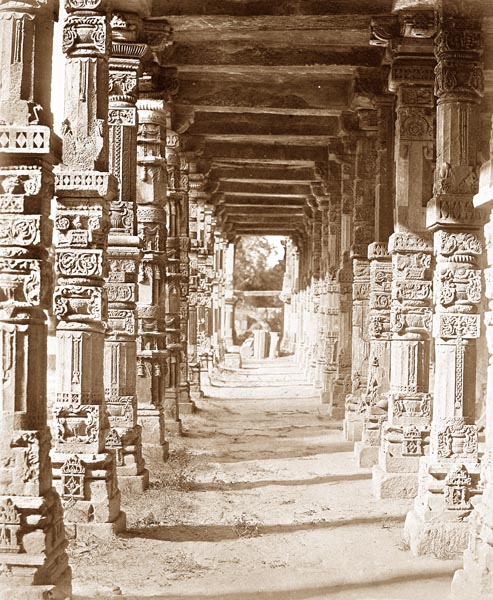
‘Interior of the Hindu Temple in Kootub’
Felice Beato (English, born Italy, 1832 - 1909), Getty Open Content Program
I
Oh the enormous avenues of the holy land, the terraces of the temple! What has become of the Brahmin who explained the Proverbs to me? I can even see the old women still, of that time and place! I remember hours of silver and light by the rivers, my companion’s hand on my shoulder, our caresses as we stood on the spice-filled plains. – A flock of scarlet pigeons thunders round my thoughts. – Exiled here, I had a place to stage the theatrical masterpieces of every literature. I could show you unknown riches. I mark the history of treasures you discovered. I see what follows! My wisdom is as despised as the chaos. What is my nothingness, compared with the stupor that awaits you?
II
I am an inventor more worthy than all who precede me; a musician, even, who has found something like the key of love. At present, a gentleman of a harsh country under a sober sky, I try to be moved by the memory of my beggarly childhood, of my apprenticeship and arrival in clogs, my polemics, my five or six widowhoods, and a few binges when my strong head prevented me rising to my comrades’ diapason. I can’t regret my old part in divine gaiety: the sober air of this harsh country feeds the depths of my atrocious scepticism. But since this scepticism can never now be put to use, and anyway I’m dedicated to fresh anxiety – I expect to become an extremely spiteful madman.
III
In an attic where I was imprisoned when I was twelve, I knew the world, I illustrated the human comedy. In a cellar I learnt history. At some nocturnal feast in a Northern city I encountered all the women of the old masters. In an ancient alley in Paris, I was taught the classical sciences. In a magnificent place surrounded by all the Orient I completed my immense work and spent my illustrious retirement. I stirred my blood. My duty has ceased. There’s no need to think of it even. I really am from beyond the grave, and free of duties.
Departure
(Illuminations VIII: Départ)
Enough seen. The vision was encountered under all skies.
Enough had. Sounds of cities, evening, and in the light, and always.
Enough known. The decisions of life. – O Sounds and Visions!
Departure into new affection and noise!
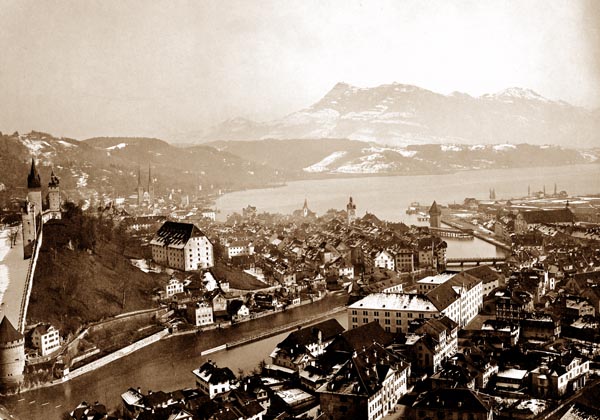
‘Haut Rhine’
Adolphe Braun (French, 1811 - 1877), Getty Open Content Program
Royalty
(Illuminations IX: Royauté)
One fine day, among a very gentle people, a superb man and woman cried out in the public square: ‘Friends, I want her to be queen!’ ‘I want to be queen!’ She laughed and trembled. He talked to his friends of revelation, of trials undergone. They swooned against each other.
Indeed, they were kings the whole morning, while carmine hangings festooned the houses, and all afternoon, as they advanced towards the gardens of palm-trees.
To Reason
(Illuminations X: À Une Raison)
A tap of your finger on the drum looses all sounds and begins the fresh harmony.
One step of yours is the rising of new men and their forward march.
Your face turns away: new love! Your face turns back – the new love!
‘Change our fate, eliminate the plagues, beginning with Time’ these children sing to you. ‘Breed, no matter where, the substance of our fortunes and wishes,’ they beg.
Arrival from forever, you who’ll depart everywhere.
Drunken Morning
(Illuminations XI: Matinée d’Ivresse)
O my Good! O my Beauty! Atrocious fanfare in which I never falter! Enchanted easel! Hurrah for the unknown work and for the marvellous body, for the first time! It began in the laughter of children, it will finish so. This poison will linger in all our veins even when, the fanfare returning, we are delivered again to the old disharmony. Oh, we now so worthy of such tortures, let us fervently grasp this superhuman promise made to our created bodies and souls: this promise, this madness! Elegance, science, violence! They’ve promised the tree of good and evil will be buried in darkness, the tyrannical virtues will be deported, so we can bring here our love so pure. It began with certain disgusts and it ends – we being unable to seize this eternity all at once – it ends with a riot of perfumes.
Laughter of children, discretion of slaves, austerity of virgins, horror of the faces and objects here, hallowed be you by the memory of this vigil. It began with all boorishness, behold, it ends with angels of fire and ice.
Little drunken holy vigil! If only on account of the mask you’ve granted us. We endorse you, method! We’ve not forgotten that yesterday you glorified every century of ours. We have faith in poison. We know how to give our whole life every day.
This is the age of ASSASSINS.
Sentences
(Illuminations XII: Phrases)
When the world has reduced to a single dark wood for our four astonished eyes – to a beach for two loyal children – to a musical house for our clear sympathy – I will find you.
Let there be a single old man here below, calm and fine, surrounded by ‘unknown luxury’ – and I shall kneel at your feet.
Let me have realised all your memories – let me be she who can gag you – I’ll stifle you.
✯
When we are strong enough – who retreats? Joyful enough – who falls to ridicule? When we are most spiteful – what might they make of us?
Adorn yourself; dance, laugh. – I’ll never be able to throw Love out the window.
✯
Beggar girl, monstrous child, my comrade! How little you care about these wretched women, these manoeuvrings, and my problems. Tie yourself to us with your impossible voice, that voice! The only hope of this vile despair.
✯
An overcast July morning. A taste of ashes floats in the air – the odour of wood sweats on the hearth – soaked flowers – a havoc of promenades – mist from the canals in the fields – why not toys then and incense?
✯
I have stretched ropes from bell-tower to bell-tower; garlands from window to window; chains of gold from star to star, and I dance.
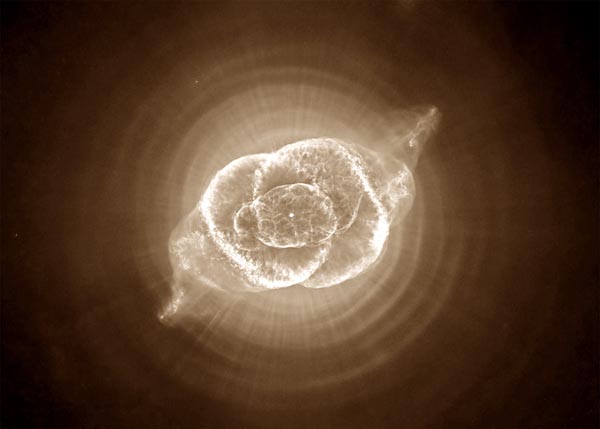
‘Cat's Eye Hubble Remix’
NASA, MAST, STScI, AURA and Vicent Peris (OAUV/PTeam), NASA Images
✯
The pond up there steams continually. What sorceress will rise against the white sunset? What violet foliage will fall?
✯
While public funds are poured out in fraternal feasts, a bell of rose-coloured fire tolls in the clouds.
✯
Deepening a pleasant flavour of Chinese ink, a black powder falls gently on my vigil. – I lower the gas jets, I throw myself on my bed and, turning towards the shadows, I see you my daughters, my queens!
Workers
(Illuminations XIII: Ouvriers)
Oh that warm February morning! An untimely Southerly came to wake our absurd indigent memories, our youthful wretchedness.
Henrika wore a cotton skirt in brown and white check, fashionable no doubt last century; a bonnet with ribbons, a silk scarf. It was much sadder than mourning. We were taking a stroll in the suburbs. The weather was overcast, and that Southerly wind stirred all the vile odours from ravaged gardens and parched meadows.
It couldn’t have bored my wife as much as me. In a sheet of water left by last month’s floods on a path up there, she pointed out some tiny fish to me.
The town, with its noise and smoke from factories, followed us a long way down the roads. Oh, other world, dwelling-place blessed by the sky and the shadows! The Southerly wind reminded me of wretched childhood events, my summer despair, the terrible quantity of strength and knowledge that fate has always kept far from me. No! We’ll not spend the summer in this miserly country where we shall never be anything but betrothed orphans. I’d not want this hardened arm to drag along a dear image any longer.
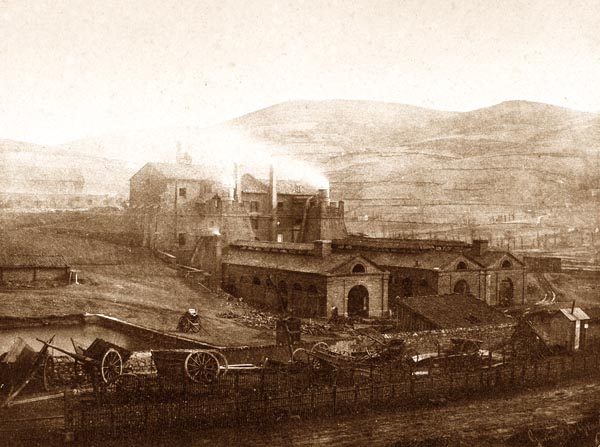
‘Factory, Terre-Noire’
Gustave Le Gray (French, 1820 - 1884), Getty Open Content Program
The Bridges
(Illuminations XIV: Les Ponts)
Grey skies of crystal. A bizarre design of bridges, now straight, now curved, and others descending in oblique angles to meet the former, and these patterns repeating themselves in other well-lit windings of canal, but all so long and weightless that the shores, weighted with domes, sink and contract. Some of these bridges are still covered with hovels. Others bear masts, signals, frail parapets. Minor chords interlace, and fade; ropes rise from the banks. You distinguish a red coat, other clothes perhaps and musical instruments. Are those popular airs, snatches from noble concerts, the remains of public anthems? The water is grey and blue, wide as an arm of the sea.
A white ray, falling from on high, annihilates this comedy.
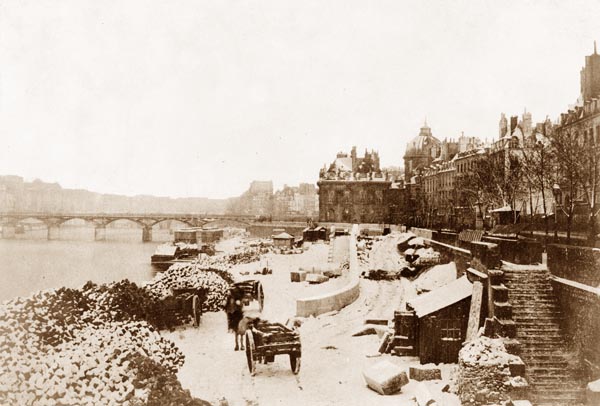
‘Vue prise du Pont des Saints-Pères’
Charles Marville (French, 1813 - 1879), Louis Désiré Blanquart-Evrard (French, 1802 - 1872)
Getty Open Content Program
City
(Illuminations XV: Ville)
I’m an ephemeral and not too discontented citizen of a metropolis thought to be modern because all known taste has been avoided in the furnishing and exterior of houses as well as the city plan. Here you cannot point out a trace of a single monument to superstition. Morals and language are reduced to their simplest expression, in short! These millions not needing to know each other pursue their education, work, and old age so identically that the course of their lives must be several times shorter than absurd statistics allow this continent’s people. So, from my window, I see fresh spectres roaming through thick eternal fumes – our woodland shade, our summer night! – New Furies, before my cottage which is my homeland, my whole heart, since all here resembles this – Death without tears, our active daughter and servant, desperate Love and pretty Crime whimpering in the mud of the street.
Ruts
(Illuminations XVI: Ornières)
On the right the summer dawn wakes the leaves and mists and the sounds of this corner of the park, and the slopes on the left hold the thousand rapid ruts of the damp road in their violet shadow. Magical procession. Wagons, indeed, loaded with gilded wooden animals, poles and gaudily-coloured canvas, galloped past furiously by twenty dappled circus horses, and men and children on their truly astonishing beasts – twenty vehicles, carved, decked out and be-flowered like ancient carriages or in fairy-tales, full of children dressed for suburban pastoral: – coffins even, under their canopies of night, flourishing their ebony plumes, filing past to the trot of the great blue-black mares.
Cities
(Illuminations XVII: Villes)
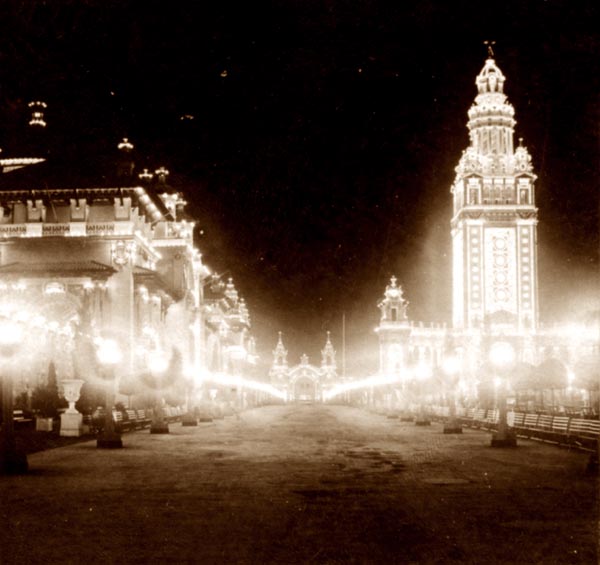
‘Eventide at the Pan American Exposition’
Kilburn, B. W. (Benjamin West) (1827-1909), The Miriam and Ira D. Wallach Division of Art
The New York Public Library: Digital Collections
Cities indeed! This is a people for whom those Alleghanies and Lebanons of dream were staged! Chalets of crystal and wood that move on invisible rails and pulleys. Old craters circled by colossi, and palm-trees of copper roaring melodiously in flames. Feasts of love resound, on canals that hang there behind the chalets. The hunt of chimes cries in the gorges. Guilds of gigantic singers flock among robes and oriflammes dazzling as the light on the summits.
On platforms in the midst of the gulfs, Rolands trumpet their valour. On bridges across the abyss, and the roofs of inns, the sky’s heat covers the masts with flags. Crumbling apotheoses overtake the high meadows where seraphic centauresses step among avalanches. Above the line of highest crests, a sea troubled by Venus’ eternal birth, charged with orphic fleets and the murmur of precious pearls and conches – that sea darkens at times with mortal lightning. On the slopes, harvests of flowers, vast as our swords and cups, bellow. Processions of Mabs in russet, opaline robes ascend the ravines. Their feet in the waterfalls and briars, the deer up there suckle at Diana’s breast. The suburban Bacchantes sob, and the moon burns and howls. Venus enters caves of smiths and hermits. Clusters of bell-towers sing the ideas of peoples. From castles built of bone an unknown music issues. All the legends evolve and elks move through the towns. The paradise of storms subsides. Savages ceaselessly dance the nocturnal feast. And, once, I descended into the stir of a Baghdad street, where crowds sang the joy of fresh labours, in the dull breeze, circling without power to elude the fabulous phantoms of the hills where they must have gathered.
What kind arms, what sweet hour will recover that region from which my slumbers and slightest movements come?
Vagabonds
(Illuminations XVIII: Vagabonds)
Pitiful brother! What atrocious vigils I owe to him! ‘I failed to seize on this venture ardently. I made light of his infirmity. It would be my fault if we return to exile, to slavery.’ He credited me with strange ill-luck and innocence, and added disquieting reasons.
I’d reply by jeering at this satanic scholar, and end by approaching the window. I created, beyond the landscape traversed by lines of rare music, phantoms of future nocturnal luxury.
After this vaguely hygienic diversion, I would stretch out on the straw mattress. And, almost every night, as soon as I was asleep, the poor brother would rise, with rotten mouth, and blinded eyes – such as he dreamed himself – and drag me across the room howling his dream of idiot sorrow!
I had in fact, in all sincerity, pledged to restore him to his primitive state as child of the sun – and we wandered, nourished on the wine of caves, and the biscuit of the road, myself impatient to find the place and the formula.
Cities
(Illuminations XIX: Cities)
The official acropolis outdoes the most colossal concept of modern barbarity. Impossible to describe the dull light produced by the immutable grey sky; the imperial glare of the masonry, and the eternal snow on the ground. They have reproduced, with singularly appalling taste, all the classical architectural wonders. I view exhibitions of paintings in places twenty times larger than Hampton Court! What painting! A Norwegian Nebuchadnezzar designed the steps of the ministries; the minor officials I saw are, as it is, prouder than Brahmins, and I trembled at the aspects of the guardians of those colossi and their site supervisors. Through grouping the buildings in squares, terraces, and closed courtyards, they’ve squeezed out the coachmen. The parks present primitive nature cultivated with wondrous art. The better district has inexplicable regions: an arm of sea, without boats, rolls its sheet of blue ground glass between quays weighted with giant candelabras. A short bridge leads to a gate immediately below the dome of the Sainte-Chapelle. This dome is artistic steel frame about fifteen thousand feet in diameter.
From certain viewpoints on the copper bridges, platforms, stairs which wind round the covered markets, I thought I might judge the depth of the city! That was the prodigious thing I could not decide: what levels of other districts lay above and below the acropolis? For the visitor in our day exploration is impossible. The commercial quarter is a circus in uniform style, with arcaded galleries. No shops to be seen, but the snow in the street is trampled; a few nabobs, rare as walkers on a London Sunday morning, move towards a diamond coach. A few red velvet divans: polar drinks are served, whose price ranges from eight hundred to eight thousand rupees. Regarding the concept of searching out theatres in this circus, I tell myself that the shops must contain sombre dramas enough. I think there are police; but the laws must be so strange that any idea of the adventurers in this place eludes me.
The suburbs, as elegant as any fine street in Paris, are favoured by a semblance of sunlight; the democratic element numbers a few hundred souls. Here again, the houses are not in rows; the suburbs lose themselves oddly in the country, the ‘County’, which fills the endless west with forests and vast plantations where savage gentlemen hunt for news in the light which they created.
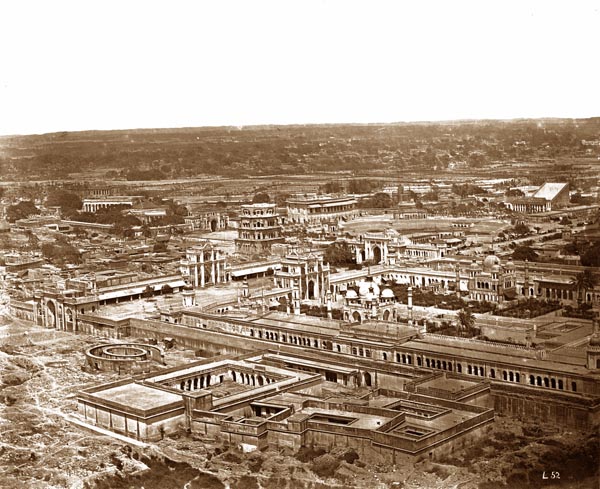
‘General View of Hosainabad and Its Vicinity, Taken from the Jumma Musjid’
Felice Beato (English, born Italy, 1832 - 1909), Henry Hering (British, 1814 - 1893)
Getty Open Content Program
Vigils
(Illuminations XX: Veillées)
I
It’s repose in the light, neither fever nor languor, on the bed or the field.
It’s the friend neither ardent nor weak. The friend.
It’s the beloved not tormented, and not tormenting. The beloved.
The air and the world unsought. Life.
– Was this it, then?
– And the dream cools.
II
The lighting returns to the centre-post. From the room’s two extremities, a stage-set of sorts, harmonic risers meet. The wall facing the watcher is a psychological succession of frieze-like intersections, atmospheric layers and geological undulations – Intense and rapid dream of deeply-felt groupings, with beings of all types in all perspectives.
III
The lamps and rugs of the vigil make the sound of waves, at night, beside the hull, around the rudder.
The sea of vigil like Amélie’s breasts.
The tapestries, half-way up, copses of lace tinted emerald, into which the turtledoves of the vigil dart.
..............................................................................
The slab of black hearth, real suns of the beaches: ah, wells of magic; sole view of dawn, this once!
![The Breaking Wave [Detail]](https://www.poetryintranslation.com/pics/French/interior_rimbaud_vigils.jpg)
‘The Breaking Wave [Detail]’
Gustave Le Gray (French, 1820 - 1884), Getty Open Content Program
Mystic
(Illuminations XXI: Mystique)
On the sloping bank, angels swirl their woollen robes on pastures of steel and emerald.
Fields of flame leap to the rounded hilltop. On the left the ridge-mould is trampled by every murder, every battle, and every sound of disaster spins out its arc. Behind the ridge to the right the line of ascent, of progress.
And, while the frieze at the top of the picture is formed of the twisting and leaping murmur of the conches of human seas and nights,
The flowery sweetness of stars and sky and the rest descends opposite the embankment, like a basket – against our face, and creates the abyss flowering and blue below.
Dawn
(Illuminations XXII: Aube)
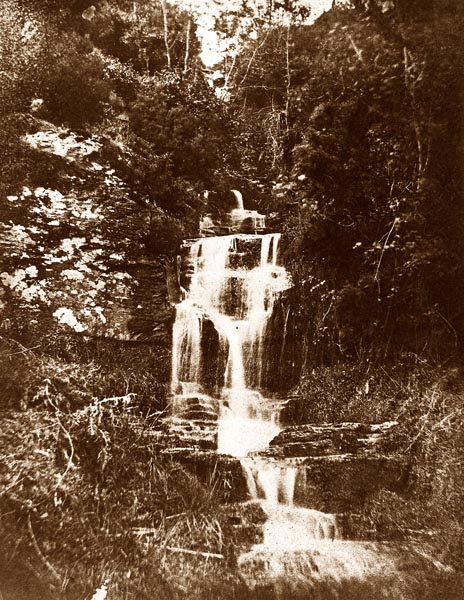
‘Forest Landscape with Waterfall’
Attributed to John Stewart (British, 1800 - 1887), Louis Désiré Blanquart-Evrard (French, 1802 - 1872)
Getty Open Content Program
I embraced the summer dawn.
Nothing was stirring yet on the fronts of the palaces. The water was dead. The crowds of shadows had not yet left the woodland road. I walked, waking vivid warm breaths, and the precious stones looked up, and wings rose without sound.
The first adventure, on the path already full of cool pale gleams, was a flower that told me its name.
I smiled at the blond dishevelled waterfall among the fir trees: on the silvered peak I recognised the Goddess.
Then I lifted the veils one by one. In the lane, waving my arms. On the plain where I denounced her to the cockerel. In the city, she fled among bell-towers and domes, and, running like a beggar across the marble quays, I chased after her.
At the top of the road, near a laurel wood, I surrounded her with her gathered veils, and I felt her vast body a little. Dawn and the child fell down at the foot of the wood.
Waking, it was noon.
Flowers
(Illuminations XXIII: Fleurs)
From a terrace of gold – among threads of silk, grey gauze, green velvets and crystal discs that darken like bronze in the sun – I watch the foxglove open on a carpet of silver filigree, eyes and hair.
Yellow gold coins sprinkled on agate, mahogany columns supporting an emerald dome, bunches of white satin and fine sprays of rubies surround the rose of water.
Like a god with vast blue eyes and snowy forms, sea and sky draw hosts of young and vigorous roses to the terraces of marble.
Mundane Nocturne
(Illuminations XXIV: Nocturne Vulgaire)
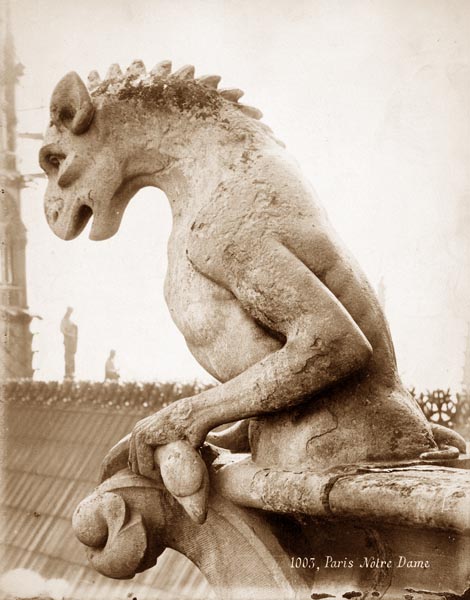
‘Gargoyle, Notre Dame, Paris, France’
Unknown maker, French (c. 1870), Getty Open Content Program
A gust opens operatic breaches in the walls – obscures the pivoting of shattered roofs – disperses the boundaries of hearths – eclipses the windows.
From the length of vine, resting my foot on a gargoyle – I climbed into this coach whose period is clearly indicated by the convex glass, bulging panels, and curved seats. Hearse of my slumbers, isolate, shepherd’s hut of my foolishness, the vehicle turns on the turf of the abandoned highway: and in a flaw at the top of the right-hand window revolve pale lunar figures, leaves, breasts.
– A green and a blue, very deep, invade the image. Un-harnessing by a patch of gravel.
– Here one whistles for the storm, the Sodoms and Jerusalems, the wild beasts and armies.
(– Coachman and creatures of dream will they take to the most stifling thickets again, to plunge me to the eyes in the silken spring.)
– And to send us, whipped on, through lapping waters and spilling draughts, to roll over the mastiffs’ baying...
– A breath disperses the boundaries of the hearth.
Marine
(Illuminations XXV: Marine)
Chariots of copper and silver –
Prows of silver and steel –
Ploughing the foam –
Rooting up stumps of the thorns.
The currents of the heath,
And the vast ruts of the ebb-tide,
Flow away in circles towards the east,
Towards the pillars of the forest,
Towards the posts of the jetty,
Whose angle is battered by whirlwinds of light.
![The Tugboat [Detail]](https://www.poetryintranslation.com/pics/French/interior_rimbaud_marine.jpg)
‘The Tugboat [Detail]’
Gustave Le Gray (French, 1820 - 1884), Getty Open Content Program
Winter Feast
(Illuminations XXVI: Fête d’Hiver)
The cascade sounds behind the comic-opera shanties. Catherine-wheels prolong, in the orchards and avenues by the meander – the greens and reds of sunset. Nymphs from Horace with Empire hair-styles – Rounded Siberian women, Chinese girls like Bouchers.
Anguish
(Illuminations XXVII: Angoisse)
Can it be that She will win pardon for my eternally crushed ambitions – that a comfortable ending will repair ages of poverty – that the day of success will lull us to sleep on the shame of our fatal clumsiness?
(O palm-trees! Diamond! – Love! Vigour! – Higher than every joy or glory! – of all kinds, everywhere – Demon, god – youth of this being-here: I!)
That the accidents of magical science and movements of social brotherhood will be cherished as a progressive restitution of primal freedom? ...
But the Vampire who makes us behave dictates that we amuse ourselves with what she leaves us, or else be more amusing.
To roll on wounds through the wearying air and the sea; in torment, through the silence of murderous water and air; through smiling tortures, in their atrociously tumultuous silence.
Metropolitan
(Illuminations XXVIII: Métropolitain)
From the indigo strait to the seas of Ossian, on the pink and orange sands that the vinous sky has washed, crystal boulevards have risen and intersected, occupied at once by poor young families who shop at the fruiterers. No riches. – The city!
From the desert of bitumen, in headlong flight under sheets of fog spread in frightful layers through the sky that curves, retreats, descends formed of deeply sinister black smoke that the Ocean in mourning delivers, flee helmets, wheels, ships, cruppers – The battle!
Raise your head: that arched wooden bridge; the last kitchen-gardens of Samaria; those masks illumined by the lantern fluttered by the cold night; the foolish undine with the noisy dress, in the river depths; luminous skulls among the pea-plants – and the other phantasmagoria – the countryside.
Roads bordered by rails and walls, barely containing the thickets, and the atrocious flowers you would call souls and sisters. Dramas damning with tedium – the property of fairy-tale ultra-Rhine aristocracies, Japanese, Guarani, still fit to receive the music of the ancients – and there are inns which are always open no longer – there are princesses, and, if you are not too overwhelmed, the study of stars – the sky.
The morning when, with Her, you wrestled among the glints of snow, the green lips, the ice, the black flags and blue light-rays, and the purple perfumes of the Polar sun – your vigour.
Barbarian
(Illuminations XXIX: Barbare)
Long after the days and the seasons, the beings and countries, the banner of bloodied meat on the silk of seas and of arctic flowers: (they do not exist.)
Having recovered from the old fanfares of heroism – that still attack our hearts and heads – far from the ancient assassins.
– Oh! The banner of bloodied meat on the silk of seas and of arctic flowers: (they do not exist.)
Ecstasies!
The blazes raining in gusts of frost. – Ecstasies! – fires in the rain from the wind of diamonds hurled out by the earthly heart, charred for us. – O world! –
(Far from the old retreats and the old flames, that you hear and feel,)
The blazes and foams. The music, churnings of gulfs and the shock of icicles on the stars.
O ecstasies, O world, O music! And here, forms, sweats, hair and eyes, floating. And the white tears, boiling – O ecstasies! – and the feminine voice reaching the depths of volcanoes and arctic caves.
The banner...
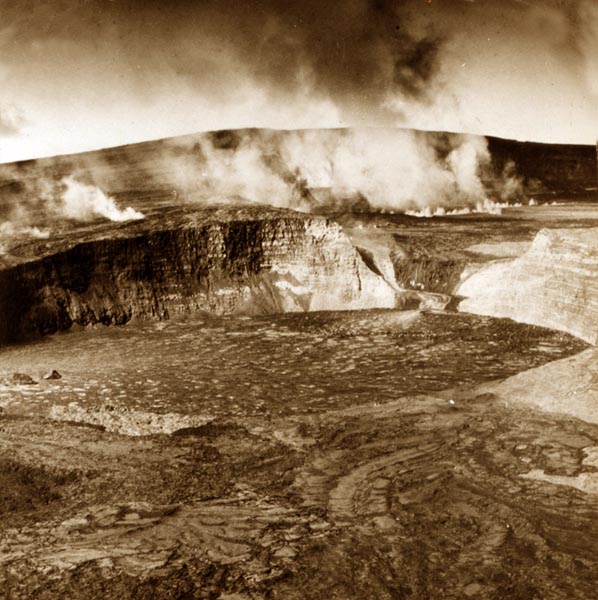
‘The Crater of Mauna Loa, Hawaii’
Keystone View Company (1920), Getty Open Content Program
Promontory
(Illuminations XXX: Promontoire)
The golden dawn and shivering evening find our brig in the offing opposite this villa and its grounds, forming a promontory as extensive as Epirus or the Peloponnese, Japan’s main island, or Arabia! Temples lit by the return of theories; immense views of modern coastal defences; dunes illustrated with torrid flowers and bacchanals; Carthage’s great canals and the embankments of a sleazy Venice; faint eruptions of Etna, crevasses of flowers and glacial water; laundries surrounded by German poplars; slopes of singular parks hung with the crowns of Japanese Trees; and the curved facades of the ‘Royals’ and ‘Grands’ of Scarborough and Brooklyn; and their railways flank, undermine, overhang the hotel’s elevations, chosen from the most elegant most colossal constructions of Italy, America, Asia, whose windows and terraces, at present full of costly illuminations, drinks and breezes, are open to the influence of voyagers and the nobility – who permit, in daylight hours, all the tarantellas of the coasts – and even the ritornellos of the illustrious vales of art, to adorn the facades of the Palace-Promontory with marvels.
Scenes
(Illuminations XXXI: Scènes)
The ancient Comedy pursues its harmonies, portions out its idylls:
Boulevards of planking.
A long wooden pier from one end to the other of a rocky field, where the barbarous crowd move beneath bare trees.
Down corridors of black gauze, following the walkers with their lanterns and leaves,
Theatrical birds swoop down on a masonry pontoon stirred by the archipelago covered with spectators embarking.
Lyrical scenes accompanied by flute and rum, sloping to recesses at ceiling height round the salons of modern clubs or ancient Oriental halls.
Magical sights manoeuvre at the amphitheatre’s rim crowned with thickets – or move and modulate for the Boeotians, in the shade of tall shifting trees, at the edge of cultivation.
The comic opera splits apart on our stage at the ridge where ten partitions intersect, that stretch from gallery to footlights.
![Theater of Dionysius, Athens [Detail]](https://www.poetryintranslation.com/pics/French/interior_rimbaud_scenes.jpg)
‘Theater of Dionysius, Athens [Detail]’
Félix Bonfils (French, 1831 - 1885), Getty Open Content Program
Historic Evening
(Illuminations XXXII: Soir Historique)
In whatever evening, for instance, the simple tourist retiring from our economic horrors finds himself, the hand of a master wakes the harpsichord of meadows; cards are played in the depths of the pond, mirror, evoker of queens and favourites; there are saints, sails, and threads of harmony, and legendary chromaticism in the sunset.
He shudders at the passing of the hunts and the hordes. Drama drips on the platforms of turf. And the superfluity of the poor and the weak on these stupid levels!
To his slave’s eye, Germany towers upwards toward moons; Tartar deserts light up; ancient revolts foment at the heart of the Celestial Empire; along the stairways and armchairs of rocks a little world, pale and flat, is to be built. Then a ballet of known seas and nights; chemistry without virtue, and impossible melodies.
The same bourgeois magic wherever the packet-boat deposits us! The most elementary physicist feels it is no longer to possible to submit oneself to this personal atmosphere, this fog of physical remorse, observation of which is already an affliction.
No! The moment of the steam room, of evaporating seas, of subterranean conflagrations, of the wandering planet and the consequent exterminations, certainties indicated with so little malice by the Bible and the Norns which it will fall to the serious being to witness – However it will be no matter of legend!
Movement
(Illuminations XXXIII: Mouvement)
The movement of lace at the brink of the weir,
The gulf at the stern,
The swiftness of slope,
The vast sway of the current
Draw the voyager through extraordinary lights
And chemical change
Surrounded by waters of the vale
And the strom.
These are the conquerors of the world
Seeking their personal chemical fortunes;
Amusement and comfort travel with them;
They carry the education
Of races, classes and creatures, on this vessel
Repose and vertigo
In the diluvial light,
In terrible nights of study.
For from the conversation among the equipment, the blood, the flowers, the fire, the gems,
The anxious calculations on the fleeing deck,
– One sees, rolling by like a dyke beyond the hydraulically-powered road,
Monstrous, illuminating endlessly – their store of studies;
Driven themselves into harmonious ecstasy,
And the heroism of discovery.
Among the most surprising atmospheric events,
A young couple hold aloof on the ark,
– Is it a pardonable primitive shyness? –
And sing and mount guard.
Bottom
(Illuminations XXXIV: Bottom)
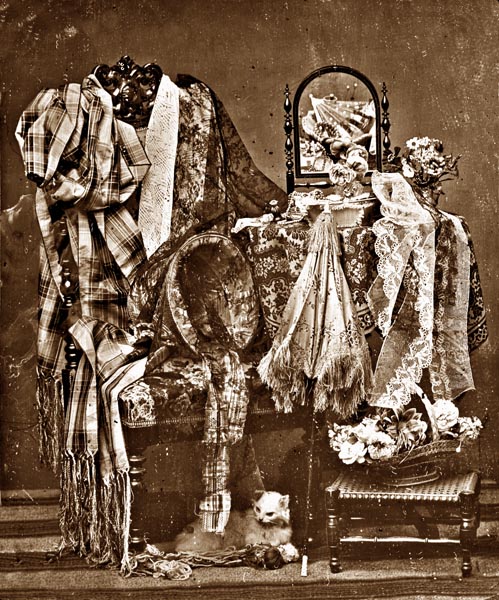
‘Still Life of Boudoir’
Louis Jules Duboscq-Soleil (c. 1855), Getty Open Content Program
Reality being too thorny for my great personality – I found myself nonetheless, at my lady’s, as a large blue-grey bird soaring towards the ceiling mouldings or trailing my wing in the shadows of evening.
I have been, at the foot of the bed-head supporting her adored jewels and her physical masterpieces, a large bear with violet gums, fur grizzled with sorrow, and eyes of crystal and the silver of console-tables.
All became shadow and fiery aquarium.
At daybreak – bellicose June dawn – I ran to the fields, an ass, braying and brandishing my grievance, till the Sabine women of the suburbs came to throw themselves on my neck.
H
(Illuminations XXXV: H)
Everything monstrous violates Hortense’s atrocious gestures. Her solitude is the erotic machinery; her lassitude, the amorous dynamic. Under surveillance by infancy, she has been, at many epochs, the ardent hygiene of races. Her door is open to poverty. There, the morality of living beings is disembodied in her passion or action. – Oh, terrible shudder of unskilled loves on the blood-stained floor and amongst transparent hydrogen find Hortense!
Prayer
(Illuminations XXXVI: Dévotion)
To my Sister Louise Vanaen de Voringhem: – her blue coif turned towards the North Sea. – For the shipwrecked.
To my Sister Léonie Aubois d’Ashby. Baow! – The buzzing, stinking summer grass. – For the fevers of mothers and children.
To Lulu – demon – who has maintained her taste for the oratories of the age of Les Amies and her unfinished education. For men. – To Madame ***.
To the adolescent I was. To this old saint, hermitage or mission. To the spirit of the poor. And to a very high clergy. Also to every cult, in such a place of memorial cults and among such events that one must surrender, according to the aspirations of the moment or our own serious vices.
This evening, to Circeto of the icy heights, fat as a fish, and illuminated like the ten months of reddish light – (her heart amber and spunk) – my only prayer as silent as the regions of night and preceding acts of daring more violent than this polar chaos.
At any price and in every guise, even in metaphysical journeys. – But then no more.
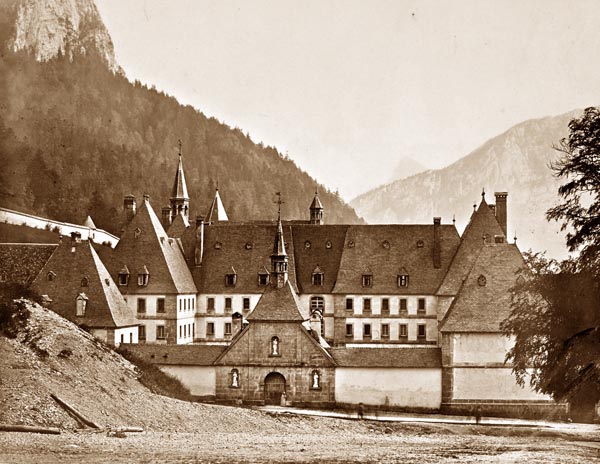
‘Couvent de la Grande-Chartreuse’
Attributed to Adolphe Braun (French, 1811 - 1877), Getty Open Content Program
Democracy
(Illuminations XXXVII: Démocratie)
‘The flag goes with the foul landscape, and our dialect muffles the drum.
In the Interior we’ll nourish the most cynical prostitution. We’ll massacre logical rebellions.
To the spiced and sodden countries! – In the service of the most monstrous exploitations, industrial or military. Farewell here, no matter where. Voluntary conscripts we’ll possess a fierce philosophy: ignorant of science, wily for our comforts: let the world go hang. That’s true progress. Forward – march!’
Fairy
(Illuminations XXXVIII: Fairy)
For Helen embellishing saps conspired in virgin shadows and impassive radiance, in astral silence. The summer heat was entrusted to mute birds and the requisite indolence, to a mourning barge beyond price among bays of dead loves and sunken perfumes.
After the moment of the woodcutters’ wives air, to the murmur of torrent below the ruined woods, to the cattle-bells in the echoing valleys, and the cries of the steppes.
For Helen’s childhood thickets and shadows trembled, the breasts of the poor, and heavenly legends.
And her eyes and her dance superior even to the precious gleams, the cold influences, and the pleasure of the unique scenery and hour.
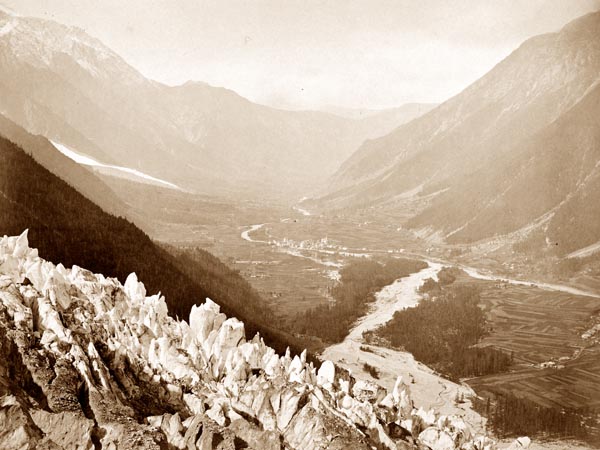
‘The Valley of Chamonix, view of Chapeau’
Bisson Frères (French, active 1840 - 1864), Getty Open Content Program
War
(Illuminations XXXIX: Guerre)
As a child, certain skies refined my perspective: all characters shaded my features. Phenomena shifted about. Now, the eternal inflection of moments and the infinity of mathematics drive me through this world where I submit to every civic honour, respected by strange children and enormous affections. I dream of a war, of right or of might, of quite unexpected logic.
It’s as simple as a phrase of music.
Genie
(Illuminations XL: Génie)
He is affection and the present because he has built the house open to the foaming winter and the sounds of summer, he who purified food and drink, he who is the charm of fugitive places and the superhuman delight of halts. He is affection and the future, the power and love that we, held in rage and boredom, watch as it passes by in the stormy sky among banners of ecstasy.
He is love, perfect and reinvented measure, marvellous and unexpected reason, and eternity: beloved machinery of the fatal forces. We have all known the terror of his surrender and our own: O pleasure in our health, impulse of our faculties, selfish affection and passion for him, he who loves us throughout his infinite life.....And we summon him again and he travels on...And if Adoration vanishes, it resounds, his promise resounds: ‘Away with these superstitions, these ancient bodies, these households and these ages. It is this époque that has darkened!’
He will not go; he will not descend from any heaven again, he will not achieve the redemption of Woman’s anger and Man’s gaieties, and all that sin: because it’s finished, he exists, and he’s loved.
O his breaths, his heads, his running: the terrible swiftness of the perfection of forms and action!
O fecundity of the spirit and vastness of the universe!
His body! The redemption dreamed of, the shattering of grace meeting with new violence!
The sight of him, the sight of him! All the old kneeling and pains lifted at his passing.
His light! The abolition of all sonorous and moving suffering in a more intense music.
His step! Migrations more enormous than the old invasions.
O He and We! Pride more kindly than lost charities.
O world! And the clear song of new misfortunes!
He has known us all and loved us all. May we know on this winter night, from cape to cape, from tumultuous pole to chateau, from the crowd to the sands, from glance to glance, strength and feelings weary, how to hail him and see him, and send him on his way again, and under the tides and over the deserts of snow, follow his visions, his breaths, his body, his light.
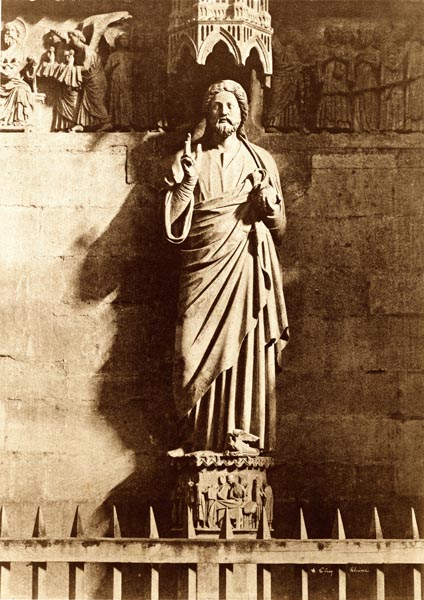
‘Statue of Christ, Reims Cathedral’
Henri Le Secq (French, 1818 - 1882), Getty Open Content Program
Youth
(Illuminations XLI: Jeunesse)
I
SUNDAY
Problems aside, the inevitable descent from the sky and the visit of memories and the gathering of rhythms occupy the dwelling, the head and the world of the mind.
– A horse takes off on the suburban turf past the fields and woodlands, riddled with carbonic plague. A wretched woman in some drama, somewhere in the world, sighs for improbable abandonment. Desperadoes long for storms, drunkenness and wounds. Little children stifle curses beside the rivers.
Let us resume our studies to the sound of the all-consuming work that gathers and rises among the masses.
II
SONNET
Man of normal constitution, was the flesh not a fruit hung in the orchard, oh childish days! The body a treasure to squander; oh, to love, Psyche’s peril or strength? Earth had slopes fertile in princes and artists, and progeny and the race drove us to crime and mourning: the world, your fortune and your peril. But now, that toil rewarded, you, your calculations, you, your impatience, are no more than your dance and your voice, neither fixed nor forced, though for the double consequence of success and invention a reason, with unassuming and fraternal humanity, in the imageless universe – strength and right reflect the dance and the voice only now appreciated...
III
TWENTY YEARS
The instructive voices exiled...physical ingenuousness bitterly stale...Adagio. Ah, the infinite egoism of adolescence, the studious optimism: how full the world was of flowers, that summer! The airs and the forms dying...A choir, to calm impotence and absence! A choir of glass with nocturnal melodies...Indeed the nerves will soon be on the hunt.
IV
You are still at the temptation of Anthony. The antics of curtailed zeal, the tics of puerile pride, weakening, and terror. But you will set yourself to this work: all the harmonic and architectural possibilities will stir round your perch. Perfect unforeseen beings will offer themselves to your experiments. Around you will gather dreamily the curiosity of ancient multitudes and idle wealth. Your memory and your senses will be simply the fodder for your creative impulse. As for the world, when you emerge, what will have become of it? Nothing, in any case, of its present seeming.
Sale
(Illuminations XLII: Solde)
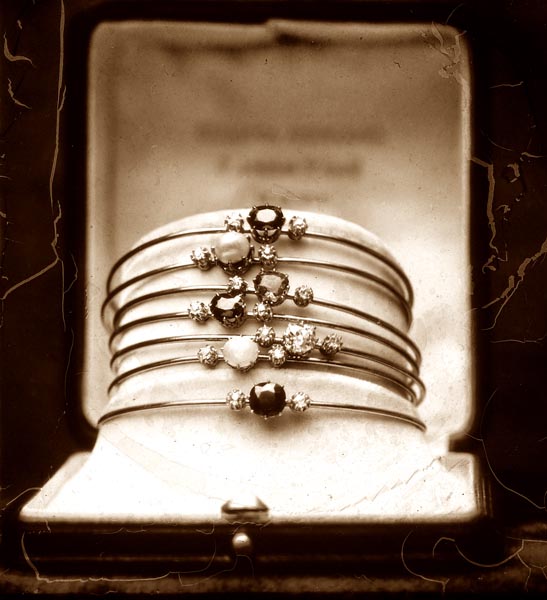
‘Gold bracelets with Precious Gems’
Lumière Brothers (c. 1898), Getty Open Content Program
For sale what the pawnbrokers have not sold, what nobility and crime have not tasted, what’s unknown to love and the infernal honesty of the masses; what neither the age nor science need acknowledge:
The Voices reconstituted; the fraternal awakening of all the choral and orchestral energies and their instantaneous application; the occasion, unique, for freeing our senses!
For sale bodies beyond price, of no known race, world, sex, or descent! Riches spurting at every step! An unrestricted sale of diamonds!
For sale anarchy for the masses; irrepressible pleasure for connoisseurs; atrocious deaths for the faithful, for lovers!
For sale habitations and migrations, sports, perfect enchantments and comforts, and the sound, motion and future they create!
For sale unheard of applications of computation and leaps of harmony. Chance finds and unsuspected terms, with immediate possession.
Wild and infinite impulse towards invisible splendours, intangible delights, with its maddening secrets for every vice and its frightening gaiety for the crowd.
For sale bodies, voices, immense unquestionable opulence, all that which is never for sale. The vendors have not yet reached the end of their stock! The salesmen won’t have to claim their commission for a long while yet!